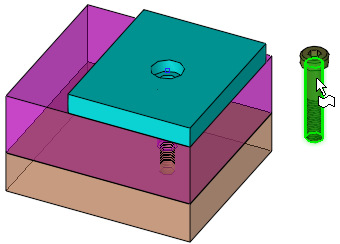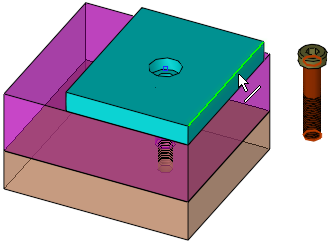|
|
Connect Component  : Coincident
: Coincident 
Access: Open this function from one of the following locations:
-
Click the
 button in the toolbar.
button in the toolbar. -
Select Assembly > Main Tools > Connect from the menu bar.
-
Select Assembly > Tools > Connect from the menu bar.
-
Select Connect on the Graphics Area popup menu.
Create connections between components by defining constraints.
Position selected faces and edges so that they share the same plane. Position selected edges and vertices so that they touch. If two entities of the same type are made coincident, they will be identical. So, for instance, two lines with a coincident constraint will have the same axis.
Coincident constraints may also be applied in the following cases:
-
Between a point and any other geometric entity. The point will then lie on the other geometric entity.
-
Between a cylinder and a line (the line will become a generator of the cylinder).
-
Between two cylinders or two co-planar circles.
Required Step 1 
- Pick the component entities to be connected.
-
Pick two points, edges, faces, planes, axes or UCSs and then <exit><exit>. If you select a second entity from the same component, your second selection will replace the first. The first selected entity moves towards the second selected entity.
For example:
|
Face selected: |
Edge selected: |
|
|
|
Notes:
-
A connect relation will not be created between two components of the same sub-assembly when the assembly is active.
-
A connect relation will not be created if none of the selected components belongs to the active assembly.
Required Step 2 
-
Set the connection options by defining constraints. These constraints involve Connect Relations (Angle, Coincident, Concentric, Distance, Parallel, Perpendicular and Tangent) and Alignments (Align and Anti-Align).
-
The constraints that are available (and the selected default) depend on the types of geometry selected for the connect operation. For example, the Concentric constraint is not available for face to face connects and, of the available options, the Coincident constraint is automatically selected, by default.
For example, depending on the types of geometry selected, the following constraints may be displayed:
Face to Edge
Edge to Edge
Face to Face
Edge to Face
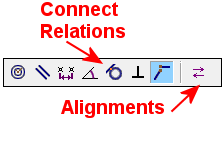



-
To define the connection, select the Coincident
 icon. Use Alignments to specify the connect solution required.
icon. Use Alignments to specify the connect solution required.For example:
Coincident Anti-Align:
Coincident Align:
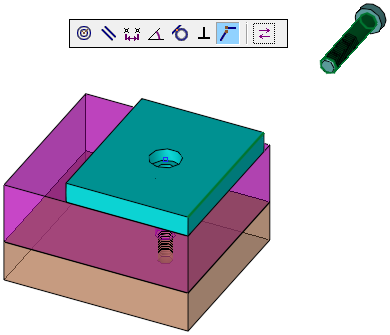
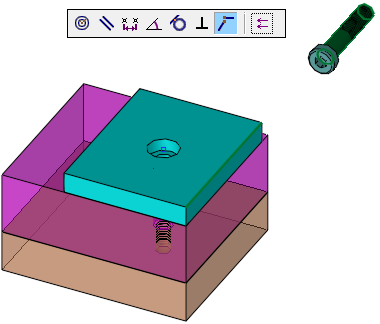
See Options and Results for the optional steps. These are only available when positioning a component specific UCS (User Coordinate System) to another component specific UCS, or a face or plane or cone face.
-
Click
 in the Feature Guide to preview the result.
in the Feature Guide to preview the result. -
Click OKOK or ApplyApply in the Feature Guide to complete the function.
|


